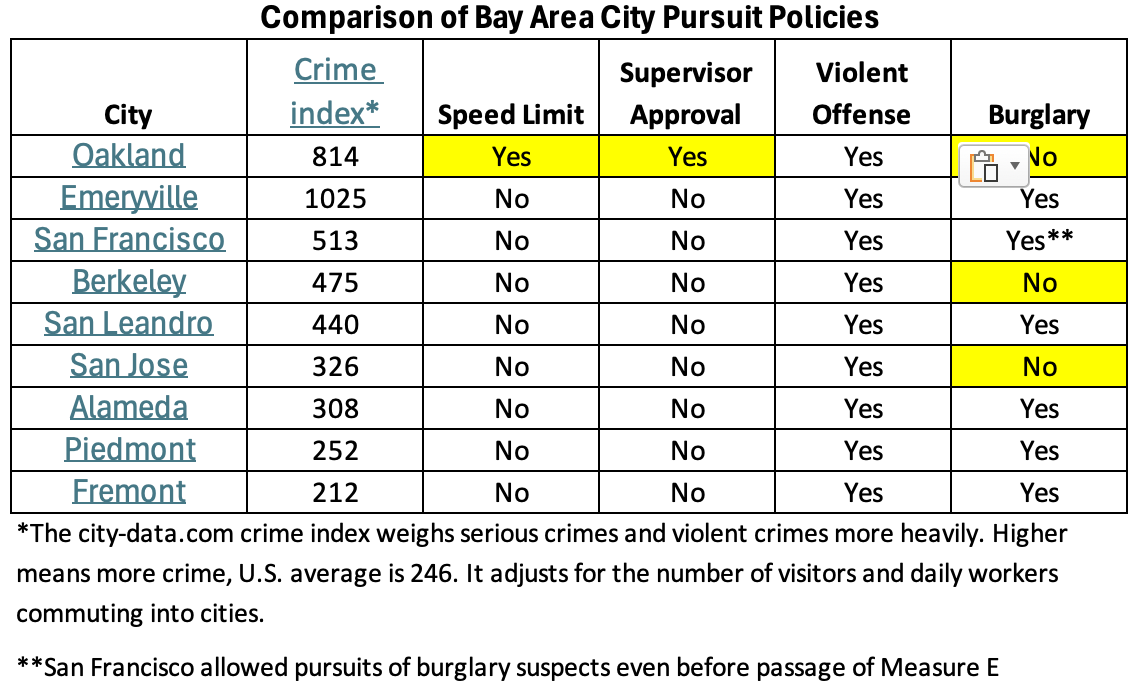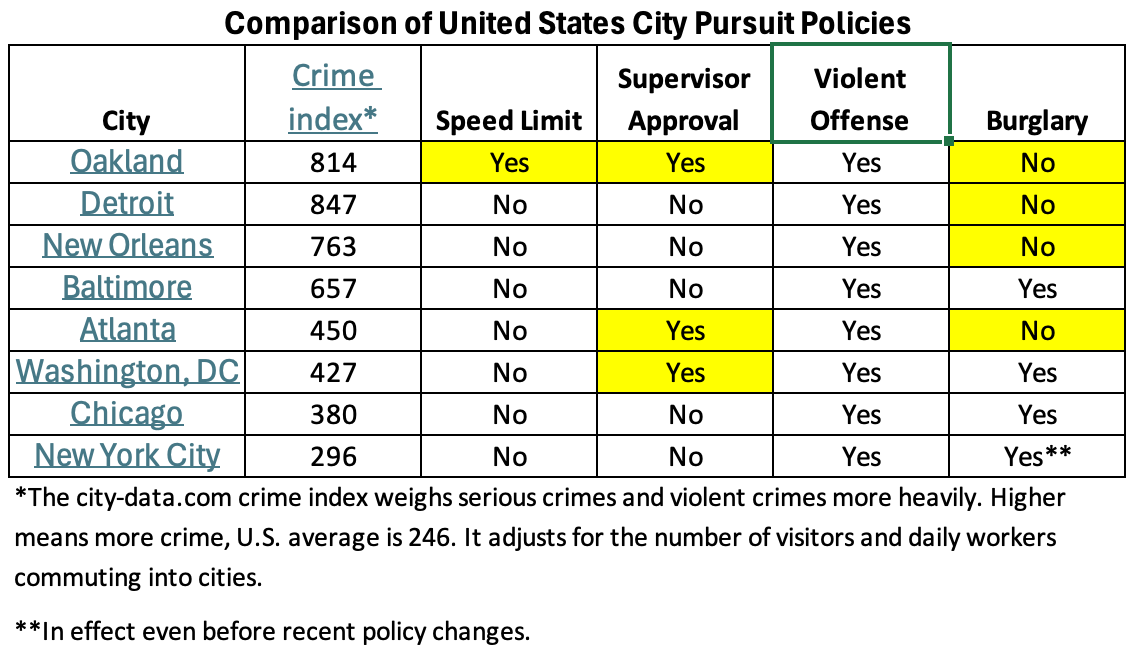Oakland’s police chief proposes to restore police pursuit powers, and the police commission pushes back
Commission avoids comment on the proposed changes, instead recommending additional police reporting, operational requirements, and oversight
The Oakland Police Commission (OPC) reconvened on January 23 to further discuss changes to Oakland’s pursuit policy with Oakland Police Chief Floyd Mitchell. Oakland’s pursuit policy and OPC have been under intense scrutiny following an ultimatum from Governor Newsom to change the policy or risk losing current support from the California Highway Patrol (CHP).
Chief Mitchell outlined his proposed changes to the policy, following a thorough account of the pursuit policy since 2004. He also noted that the policy has not undergone a formal review in over five years. He requested formal comments and review by the OPC, which he hasn’t received after sending a memo on January 3rd, with a follow up of the entire draft on January 13th. He noted that this draft “is not the final product”, and he is distributing to stakeholders to provide input. These include the negotiated settlement agreement (NSA) plaintiff attorneys, the federal monitor/compliance director, city attorney, inspector general, Community Police Review Agency, the Oakland Police Officers Association, and the Oakland community.
Chief’s changes to the policy are in line with national trends
His changes include amending and expanding the situations in which officers can initiate a pursuit. Currently, pursuits are restricted to violent forcible crimes which include felonies and crimes with a firearm. The changes would add felonies, violent misdemeanors and residential and commercial burglaries. He would also authorize pursuits of fleeing suspects that include sideshows and drivers that impose a danger to the public. Finally, he would remove the requirement for supervisor approval for pursuits over 50 miles per hour, which added an extra administrative burden and reporting requirements.
These changes are in line with surrounding, state and national pursuit policies. Currently, Oakland’s strict requirements, need for supervisor approval to pursue a suspect, and the speed limit make Oakland’s pursuit policy the most restrictive policy in the Bay area, and of all surrounding cities and cities of similar size in the state and nation (see Appendix for pursuit policy comparison).
Commission is unclear about NSA
OPC has in the past refrained from recommending any changes to the policy due to their perceived risk of bystander injury from pursuits. OPC held another Town Hall meeting on January 15 to, in their words, “dispel the myths” surrounding the policy. OPC Chair Ricardo Garcia-Acosta emphasized that changing the pursuit policy is out of their jurisdiction since it does not pertain to the NSA.
During the January 23rd meeting, Chief Mitchell challenged that view, and outlined how the pursuit policy does affect tasks in the NSA, such as use of force, and therefore it is necessary to receive a review of the policy changes from the police commission. He also made these points in the memo he sent to OPC on January 3rd. In response, OPC Chair Garcia-Acosta admitted that the policy is under the purview of the NSA and therefore also the jurisdiction of the commission to review it.
The police commission’s role as a review body on the policy is not to be confused with approval. Chief Mitchell has noted that he has the final say on changing the policy, after review by stakeholders.
OPC withholds approval of policy, submits comments instead
Despite the many previous meetings, and repeated requests from the chief, the council, the interim mayor and the governor for action from the commission, OPC chose not to vote their (non-binding) support or opposition to the chiefs proposed changes. Instead, they approved a motion to submit the police commission’s comments to the Chief. These comments were revealed at the meeting without prior disclosure to the public, without opportunity for public comment, and without any revisions in response to public input.
The comments focus on the injury and harm of pursuits as well as preventative practices to avoid recidivism. They push for additional reporting requirements by OPD, technology alternatives to pursuits, evaluation of insurance impacts, and adding more operational requirements and oversight on police.
The comments do not directly address any of the proposed pursuit changes, nor the costs to the police and city of the additional oversight, nor the impacts on public safety of any proposed pursuit changes or their recommendations. Consistent with its historical actions, these comments focus exclusively on means of further restricting the capabilities of police and adding administrative burden.
The comments included the following:
A review of policy impacts of these changes, including those that affect tasks in the NSA, vehicle stops, training changes, and discipline matrix policies relating to the interaction with juveniles (Chair Garcia-Acosta has a background in youth violence prevention programs).
Monitoring diversion efforts after arrest, and partnership with DVP (Department of Violence Prevention) to have strategies for repeat offenders and impacts on recidivism.
Technology that can assist and decrease pursuits, such as drones, fixed wing aircraft, and GPS tagging/tracking devices
Explore communication protocols of pursuits with surrounding jurisdictions and data about CHP activities in Oakland
A plan for data collection for OPC review, which includes pursuit data and accurate reporting of crashes as well as documenting what deterrent methods were attempted prior to the pursuit
Plan for public engagement and community meetings if accidents do happen
An examination of legal liability from increased pursuits due to wrongful deaths and insurance ramifications
Training protocol, including enhanced training of driving technique (this was added following comments from Commissioner Angela Jackson-Castain, who described police speeding through stop signs in her neighborhood)
Commissioners believe their mandate is to deter police pursuits
Prior to the motion, Commissioners questioned the chief and OPD about litigation costs under the presumption that any policy changes would increase injuries. None of the responses from OPD were used to revise Garcia-Acosta’s draft motion. The only revisions made during the meeting were to increase reporting and training requirements at the direction of other commissioners, not in response to OPD or public input.
The only commissioner to publicly support the changes was Commissioner Samuel Dawit, who wondered if the changes are going far enough and whether they should also include traffic violations such as “blowing through red lights.” His comments were the only ones interrupted by Chair Garcia-Acosta, who instructed him to limit his remarks due to time.
The Chair reiterated that OPC “stand[s] with our city leadership as a deterrence for future pursuits.” These comments are in keeping with OPC’s prior pursuit policy review, which recommended that city council and OPD “seek alternative means of tracking crime perpetrators” without increasing police pursuits.
Next steps
Chief Mitchell will be finalizing the changes to the pursuit policy after review from other stakeholders. There was no mention of future discussion by the police commission.
Appendix: Comparison of Oakland pursuit policy to other cities
Oakland has the most restrictive pursuit policy in the Bay Area
When compared to other cities adjacent to Oakland and similar sized cities in the Bay area, Oakland has the most restrictive policy. This is due to the speed limit and need for supervisor approval. Oakland, Berkeley, and San Jose do not allow pursuits for burglary and non-violent offenses.
Of note, Oakland and Emeryville have the highest crime indices, but have different pursuit policies.

Oakland has the most restrictive pursuit policy in similar cities in California
When comparing Oakland to other similar-sized cities in California, Oakland has the most restrictive pursuit policy. No other city requires supervisor approval for all pursuits, nor does it have a speed limit. San Jose is the only other city which limits pursuits to violent felonies & offenses.

Oakland has the most restrictive pursuit policy compared to other cities nationwide
When compared to other cities of similar size or larger, Oakland has the most restrictive pursuit policy. This is due to the requirement for supervisor approval for initiating a pursuit as well as the speed limit. Atlanta is the second most restrictive, as it does require supervisor approval. Oakland, Atlanta and Detroit limit pursuits to violent felonies. Cities with high crime indexes such as Detroit, Oakland and New Orleans had pursuits limited to violent offenses only.

Tags: Radar, Police Commission, Policing






Thanks for this valuable analysis. But given the immediate importance of the mayoral election, could you please cover the obscene mailers that the unions backing Barbara Lee have been sending out, trashing Loren Taylor is the most shameful and dishonest way. I am not involved in his campaign at all -- haven't even contributed -- but I have been shocked by the the decietful messages and images to the point of contacting the Lee campaign. They claim she is not responsible for these, but she has refused to disavow them, taking advantage of $250,000 of this support. I'm looking to you to dig into this. Please.
It really seems that the Oakland Police Commission is a "rogue" group of sorts. Un-elected, wielding tremendous power, and in the spirt of Oakland dysfunction, driving the car over the cliff. How to intervene? How is it legal? Are there structural changes that can be made to rein them in?